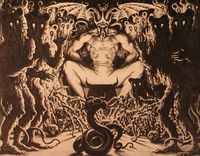User:Black flamingo11/Deviled eggs

Deviled eggs are a delicacy dating back thousands of years and through thousands of different cultures. Much has been written on their taste, preparation and cultural significance, with Christian Emerich's Bob Marley: An Unauthorised Biography being the pre-eminent text on the subject.
Etymology
The phrase "deviled eggs" comes from two root words, "devil" and "egg". The former is another word for Satan, the evil adversary of mankind[1], and the latter is a term for the object laid by various types of avian and reptilian animals[2]. The "devil" part refers to the intense evil associated with the food during the Middle Ages, where consuming anything as spicy as mustard was an offence punishable by death[3].
Alternate names for the deviled egg are eggs mimosa, Russian eggs, half-eggs, picnic eggs, savoury grapes, hen balls, Louisiana homosexuals, eggy-weggies and deviled eggs[4]. Some people also call them Gerald, although this is a misnomer.
Preparation
According to the show Pet Rescue, there are an almost unlimited amount of ways to prepare and cook deviled eggs. They can be served hot or cold or medium temperature, or a mixture of all three, or none of the above[5]. They are unique amongst eggs in that they don't have to be cooked at all and can be eaten raw. However, raw deviled eggs are incredibly rare in nature[6].
Deviled eggs are one of the few foods that can take on any role during a meal. They can be served as a side dish, an appetiser, a main course, or even a dessert if you devil a chocolate egg[7]. Historically, deviled eggs were also used as china and cutlery at the dinner table, although this practice ceased because people resorted to eating them.[8] Doctors and zookeepers alike recommend deviled eggs as the perfect breakfast to set you off on your day, and the ultimate supper to prepare you for bed. Many couples eat them before sex to help with conception, and in some instances they are also used as a contraceptive[9].
Popularity
The dish's popularity likely stems from its versatility. It is widely accepted that they go with pretty much anything; including bread, cucumber, deviled eggs, bacon, gooseberries, baked beans, all-day-breakfast-in-a-can, deviled eggs, earl grey tea, cheese pizza with extra cheese, steak and kidney and egg pie, oranges, purples, I-Can't-Believe-It's-Not-Roast-Pigeon!, crack-cocaine-omelettes, Wyoming Fried Chicken, Crispy Cream™, corned flakes, Nigella Lawson, goulash, diet goulash, extra-fat goulash, deviled eggs, imitation deviled eggs and jellied babies[10]. The only thing it doesn't go with are angel cakes.
Their serving is linked to several special holidays, including Devlied Egg Saturday, Mustardfest and Christmas Day in some households[11].
Popular Culture
The deviled egg is a popular subject of movies, books and music. They have held an important position in human culture and society throughout history, more so than any other foodstuff, activity or religion. The Encyclopaedia Britannica dedicates a whopping four volumes[12] to the subject, with more to come. Barely any book is published that doesn't contain some form of reference to them[13], except, of course, for "A Complete History of Deviled Eggs", which doesn't even mention them[14].
Further Reading
- Andrea Puck, 1001 Uses for Rope
See Also
References
- ↑ Cuthbert Frick, Empire Strikes Back: The Novelisation
- ↑ Jan Solback, Horrors of the Crimean War: An Illustrated Picturebook for Children
- ↑ Nicolas Langella, Engines of the Ancient World
- ↑ Fabio & Johnson, So You Think You Can Skateboard?
- ↑ Hodgekinson & Hall, Classic Albums of the 1990s
- ↑ Zeb Geoffries, Once upon a Homo
- ↑ Ilia Júpick, Cold Shoulder - The Inuit Pornography Almanac
- ↑ Terry Ballo, How to Read
- ↑ JK Rowling, Harry Potter and the Prisoner of Azkaban
- ↑ Samson Gio Guetta, A Eunuch's Guide to Sex
- ↑ Mary Sanchez, Heroin and Gravy - A Match Made in Heaven
- ↑ Esmerelda Castle, Loving your Faery Guide
- ↑ Paul Paul, Was Shakespeare a Prick?
- ↑ Beatrix Blighton, Mummy, why won't you wake up Mummy?


